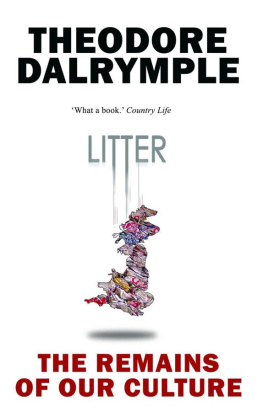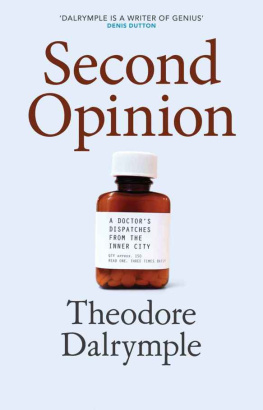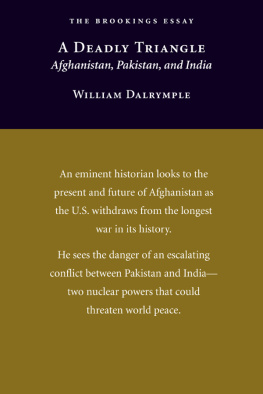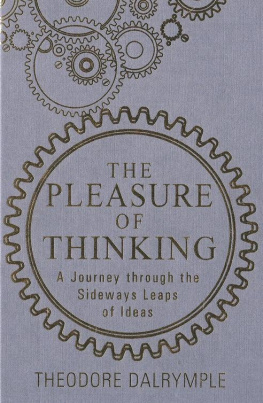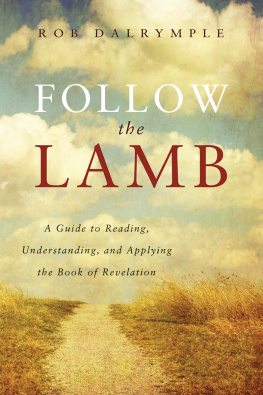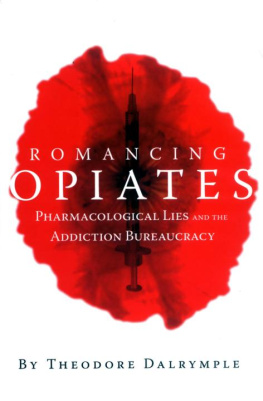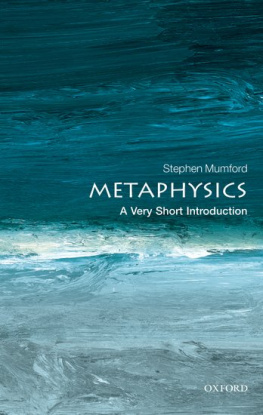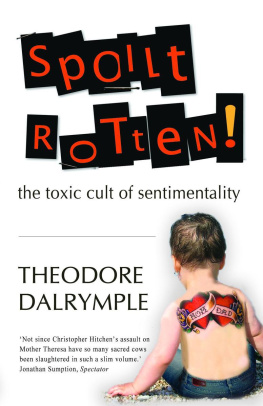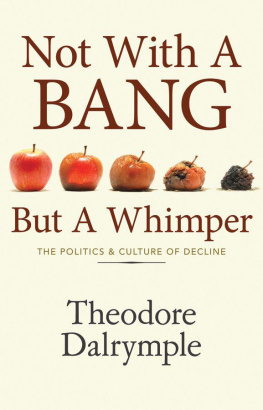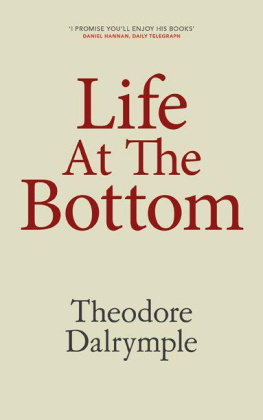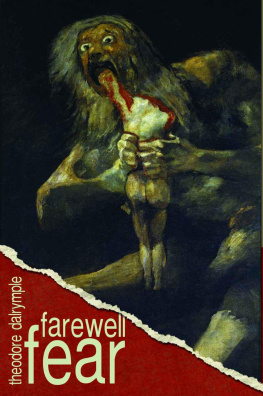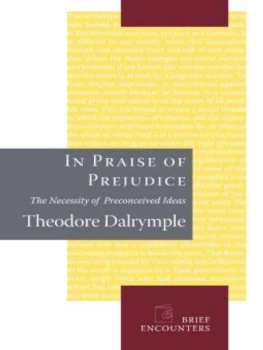Out Into the
Beautiful World
Theodore Dalrymple
Copyright Anthony M. Daniels 2015
All rights reserved. No part of this book may be reproduced in any form or by any means, electronic or mechanical, without permission in writing from the publisher except by reviewers who may quote brief passages in their reviews.
Published by New English Review Press
a subsidiary of World Encounter Institute
PO Box 158397
Nashville, Tennessee 37215
&
27 Old Gloucester Street
London, England, WC1N 3AX
Cover Art & Design by Kendra Mallock
ISBN: 978-1-943003-03-7
E-Book Edition
NEW ENGLISH REVIEW PRESS
newenglishreview.org
For my wife, Agn s
Carry me out
Into the wind and the sunshine
Out into the beautiful world.
W E Henley, Discharged, Number XXVIII of the Hospital Poems (Henley was a patient of Joseph Lister in the Edinburgh Royal Infirmary for eighteen months. Lister saved his tuberculous leg from having to be amputated, as his other already had been).
Preface
W HEN I WAS a young man I thought that metaphysics was the most exciting (and important) thing in the world. I even had a friend whose ambition it was to place the whole of human knowledge on a different, and of course a much firmer, metaphysical basis. I have lost touch with him, but as far as I am aware he did not succeed. If he did, I have not heard.
I wish now that I had not wasted so much time on the imponderable questions of metaphysics but had used it to more worthwhile effect. Of course, everyone has metaphysical presumptions whether he knows it or not; often these presumptions vary from moment to moment according to need, but I have not noticed that conscious metaphysicians are more consistent or live better than unconscious ones. Rather than study philosophy, I should have studied insects.
In the little essays that follow, I have no grand theory to prove, no single message to convey. Small things and slight occurrences have caught my attention and caused me to reflect a little. I hope only to please the reader. My thanks as ever go to the editor of the New English Review, Rebecca Bynum.
Apocalypse Now
P RACTICALLY ALL journalism is forgotten the day after it was written, even by those who wrote it. This is fortunate, for it means that the inevitable idiocies of the genre receive a swift and decent burial, never to be disinterred: nothing ever comes back to haunt a journalist and oblivion overcomes all. That is why journalists can afford to be fearlessly outspoken; no one will ever remember, except in the vaguest terms, what they wrote. Fairness, accuracy, consistency: these are qualities with which the journalist can easily, and in some publications must, dispense.
I do not exclude myself from these strictures, far from it. Sometimes at the end of a day when I have written two or even three articles I relax with friends and they ask me what I have written that day. Not only can I not remember the details, I cannot remember even the subject of my articles. Keats thought that his name was writ in water; in what then, we might ask, are journalists name written? Perhaps they are not written at all.
The evanescence of ones effusions in print notwithstanding, their oneness with Nineveh and Tyre, it is good for the character to reflect upon ones own grosser errors. I was reminded of one of these the other day by a comment posted on the internet about a book I wrote more than a quarter of a century ago, all the more troubling because it was written by someone by no means hostile.
The book was an account of a journey across Africa that I made by such means of public transport as I could find. On that journey I passed through Rwandaabout seven years before a genocide of the kind that was supposed never to happen again after the Second World War. I was of course aware of the conflict between the Hutu and the Tutsi (whom I remember a Belgian expatriate describing as the long, tall ones) but I gave as my firm opinion, founded upon only the slightest and most superficial acquaintance with the country, that the conflict had by then been settled once and for all, irredeemably, in favour of Hutu predominance and power. President Juvenal Habyarimana was so firmly in power that it was difficult to believe that he would ever be unseated from it; his National Revolutionary Movement for Development, the only permitted political party, was ubiquitous. Children became members of it, ex officio , at the moment of their birth; they had no choice in the matter and there was no escaping it, notwithstanding the fact that ones political opinions at the age of an hour are a little undeveloped.
It seemed to me likewise indisputable that Rwanda was, by African standards, an efficient and well-administered state. You had only to stand at the frontier with Zaire (as the Democratic Republic of the Congo then was) to see that this was so. On the one side, the Congolese, all was disorder and chaos; on the other, the Rwandan, all was order and neatness. This might have been as much to do with the pressure of circumstances as with the political arrangements, for while humans to work the land were in short supply in Zaire, land for humans to work was in short supply in Rwanda. The one circumstance favoured carelessness, the other care; perhaps the respective political regimes of the two countries were irrelevant to the evident difference in the way the land was looked after on either side of the frontier. After all, Mobutu had a sole political party of his own, the Popular Movement of the Revolution, to match Habyarimanas. The difference between Rwanda and Zaire was like that between North Korea and Cuba, and whether one prefers ones dictatorships ferociously obsessional or slovenly bohemian is a matter of taste.
Anyway, I did not foresee the invasion of Tutsi exiles, driven out of the country by previous ethnic violence, only two years later: an invasion that would lead before long to what was possibly the most thorough and efficient attempted genocide in history. Such, then were my powers of prediction, my insight into the workings of the future: I was completely oblivious to the approach of one of the greatest political catastrophes of my adulthood.
I was not alone in this, of course; but not many of those who failed to foresee it committed themselves so firmly to paper. One interesting question that I have never seen asked let alone answered, is whether, had the invading rebels foreseen the genocide that their invasion unleashed, they would have acted any differently? In other words, would they have sacrificed the attainment of power to save the lives, or rather to prevent the murder, of hundreds of thousands of their kinsmen? Either they foresaw the genocide or they didnt; if they didnt they were as blind as I, which is some consolation to me for my lack of powers of foresight.
Lack of knowledge of a country or a situation never stopped anyone from prognosticating about it. In his famous book about the Anschluss of 1938, and the subsequent dismemberment of Czechoslovakia, called Fallen Bastions , the then-celebrated British correspondent, G. E. R. Gedye, who wrote for both the Times of London and the New York Times , tells how he wrote an article soon after his arrival in Vienna in which he praised the charming and easy-going tolerance of the people, published by ill-chance on the very day of a vicious pogrom against the citys Jewish population. And even if Gedye were on closer acquaintance to write no more on the celebrated Gemtlichkeit of the Viennese, even if he were to become only too aware of the extreme brutality of the triumphant Nazis (he wrote the book, 500 closely-printed pages long, at high speed in the British legation in Prague, whither he had been expelled by the Gestapo), even he who had read Mein Kampf and was aware both of what he called its insane incitements against the Jews and its clear blueprint for a general war which he took completely and correctly at face value, why even he had no inkling of the approaching Holocaust. He foresawas he sawendless persecution of Jews, but he did not foresee their total annihilation.
Next page

